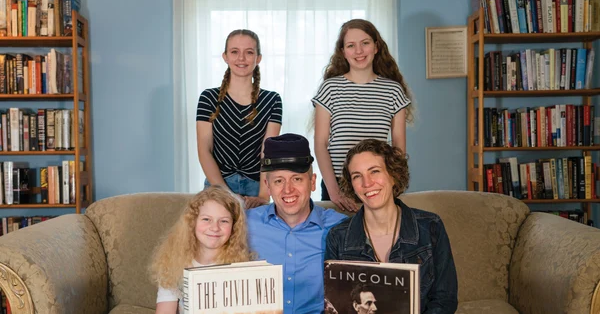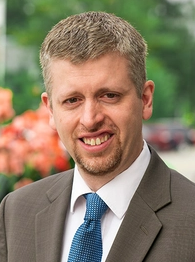
After working for nearly two decades in state-based public policy providing expert analysis in school choice, school finance and more, Ben DeGrow has accepted the position of policy director, education choice, at ExcelinEd. During his tenure at Michigan’s Mackinac Center for Public Policy and Colorado’s Independence Institute, DeGrow led dozens of studies and research project initiatives while managing and supporting coalitions to advance student opportunity through greater parental choice.
A summa cum laude graduate of Hillsdale College, where he earned a bachelor’s degree in history, and The Pennsylvania State University, where he received a master’s degree in history, DeGrow’s classroom experience includes graduate assistance and substitute teaching in public elementary and middle schools in Michigan.
DeGrow spoke with reimaginED recently about how his experience leading state-based initiatives has prepared him to enter the national arena of education choice at ExcelinEd.

reimaginED: In addition to being a policy expert, you’ve spent time in the classroom, both as a university graduate assistant and as a substitute teacher in Michigan public schools. Were your early ambitions to be a classroom teacher?
DeGrow: My early interest and love of history, and particularly American history, convinced me that I would like to be a college professor in that field. When I was a senior in college, I asked five professors what they thought of my academic ambitions. Four out of five basically told me, “You don’t want to do this, this job market is very challenging.” That wasn’t enough to deter me. I went to graduate school and served as an assistant for general requirement classes for undergraduate students. I got to see the less glamorous parts of teaching, like grading blue book exams, as well as the more enjoyable things like leading student discussions.
After deciding to get a terminal master’s degree instead of a Ph.D., I thought the next best thing I could do was teach high school history. I quickly realized it was not my calling. Then when I found the world of public policy, I realized that was a place where I could better put my talents to work.
I worked as a substitute teacher between teaching university students and high school students. That was an experience that allowed me to teach in a rural setting and experience the challenges of classroom management and learn what kinds of issues teachers face at the ground level. That experience is something I always keep in mind as I research and write. I try to think in terms of policies that are designed to help meet a student’s individual needs. To be most effective in public policy, you have to have an understanding of the different aspects of the education system and how it operates.
reimaginED: Before joining the Mackinac Center, you provided analysis on school choice, school finance, collective bargaining and education employment policies at Colorado’s Independence Institute. How did your work there prepare you for what was to come next?
DeGrow: I got on board at the institute because my wife worked there part time. I knew the people at the institute, and when they needed a research project exploring some education topics, I signed on because I had the training from grad school to know how to do research. From my education experience, my research background, I loved the opportunity to explore public policy and have an impact.
I just continued to develop that expertise over time. I learned more from every opportunity and challenge that came along. I had the chance to read, research, speak, and to better understand how the system works. I did that work in Colorado for about 12 years, and over that time we did everything from highlighting innovative school district models to addressing issues related to improved school funding systems, and then working with local school board reformers on ambitious projects to provide greater education choice.
All of that played a role as I moved from Colorado to Michigan, which proved to be a more challenging environment when it comes to education choice. I think it all helped prepare me to do policy work at the Mackinac Center and make an impact on some key challenges there.
reimaginED: What was your role at the Mackinac Center, and of what project launched during your tenure there are you most proud?
DeGrow: In my six years on the great team at the Mackinac Center, I valued the opportunity I had to visit and meet with charter school leaders, to observe them in action and be able to be a voice, an informed voice, that could call on the research, that first-hand experience, and point out that the partisan political attacks against them were unfounded. I was happy when we were able to fend off attacks on parent options at public charter schools.
I was also appreciated getting to participate in a project we called the context and performance report card. That provided another lens to assess how well schools were performing by capturing multiple years of test data and adjusting the data based on the number of students in poverty. I had the chance to visit schools that were beating the odds, some charter schools, some traditional district schools, that were working in either challenging urban or rural environments.
But I would say the capstone, the most important thing I participated in was the work to give Michigan families a breakthrough of education options through Let Kids Learn. We heard the frustrations of parents during COVID, many of whom had taken their children’s schooling experience for granted, and then realized they had at their disposal the chance to push for big policy changes that could help them. I believe the Mackinac Center and our partners were able to make a great deal of progress in raising the profile of Michigan as a place where education choice could grow and flourish to help children and families. Even though it’s not reached the finish line yet, we made a great deal of progress.
reimaginED: What would you cite as a big takeaway from your work at the Mackinac Center?
DeGrow: I think that sometimes we tend to think once a major law is passed, the work is done. You wipe off your hands and move to the next thing. But even then, there are legal battles still to fight to preserve school choice programs, not to mention the challenges with implementation. That is important and challenging work that needs and deserves attention as well. I think Florida is an example of that. You have one of the preeminent private school programs in the country, and yet parents and supporters have had to defend it over and over. Reform is work that’s never finished, as Gov. Bush would say. There is always more to be done to ensure that students have the educational opportunities they deserve.
reimaginED: You’ve appeared before legislative committees in recent years in connection with your school choice work. What do you think you brought to those proceedings, and did you feel your testimony was fruitful?
DeGrow: I’ve testified on a lot of issues over the years. Legislators usually come into the hearing already set in their decisions. That’s just the way it works. Testifying before committees about school choice in particular has given me the opportunity to point to the facts and the data and the track record, which have only grown over time, and allowed me to say, “This is no longer an unknown experience. It works for many, many students and families.”
We have more and more data that show education choice programs work. These programs satisfy parents, they provide positive academic outcomes, and the financial ramifications are negligible or even beneficial. Whenever I’ve had the opportunity to testify, even if the particular legislators in the room were not persuaded, it was an opportunity to get the word out there, to challenge people who are paying attention.
When the spotlight is shining on you at the hearing, you have the opportunity to highlight the growing evidence of success and answer technical questions and deflate some of the myths that are out there. It’s an opportunity to educate a broader audience and to speak on behalf of families who need those options.
reimaginED: You’ve recently started a new chapter in your career as policy director for education choice at ExcelinEd. How did that opportunity come about, and what would you like to accomplish in your new role?
DeGrow: I learned that the Foundation needed to fill a position on its opportunities team. They were looking for someone to provide research and leadership to help advance both public and private school choice options. I was attracted to the opportunity to have an impact in multiple states at a point when many states have recently created or expanded private school choice programs, to help craft effective policies, to make them as effective as possible and to remove as many of the hiccups as possible. That opportunity was very hard to resist.
At the same time, there is the task of implementing these programs, which will be critical. The extent to which I can support those efforts to apply best practices in those states, keeping students at the forefront, will be important. Every time a challenge is successfully met, it’s a feather in the cap for education choice that shows other states that they, too, can help families and do this well. If states are not meeting challenges effectively, it makes it more difficult for other states to implement education choice programs. Having a hand in providing assistance to advance these important policies is an honor, and I’m looking forward to getting to work.
reimaginED: What do you see on the horizon for education choice? How do you see progressive education choice legislation, such as the expansion of education savings accounts, further expanding education choice opportunities for families?
DeGrow: I think we’ve crossed the threshold from just seeing these programs as being beneficial for students with special needs, those who are at risk and those who are from lower-income families, to recognizing that education freedom is an opportunity across the board for all students. I think we’ll see more states follow West Virginia and Arizona and other states that are looking at universal education savings accounts as an opportunity to reach a broader group of students and families who may have been overlooked. So, I think just building the coalition for expanded education choice, universal education savings accounts, and making sure the policies are constructed thoughtfully and implemented effectively will be a big focus of the movement for the next couple of years.
reimaginED: You are the father of three daughters. What kind of educational environment would you like them to inherit?
DeGrow: I started public policy work before my kids were born. When you become a parent, it makes you that much more serious about the work. You understand in a more concrete sense what other parents are going through when their children are in an unsuitable or unhealthy school environment.
Our children have experienced charter schools and homeschooling. We have appreciated the flexibility and opportunity we’ve had to pursue those options. We know some families have that opportunity, but not all do. It gives me even more of a motivation to support things like education savings accounts, hybrid models and microschools that provide more access to families and the sound policies that support them, seeing how this kind of flexibility has helped my kids on their paths.
I hope my daughters will continue to explore their interests and find their place in the world and appreciate all the ways we’ve invested in them, and that wherever they go next, they will benefit from having had education choice.


